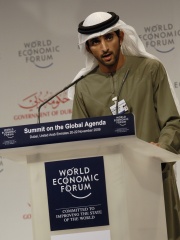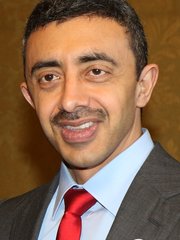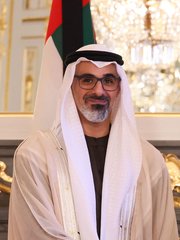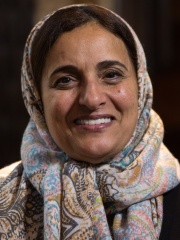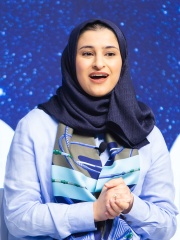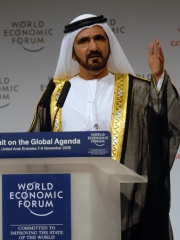
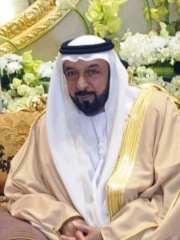
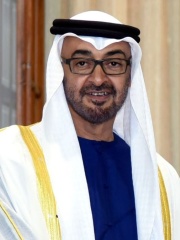
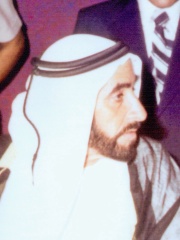
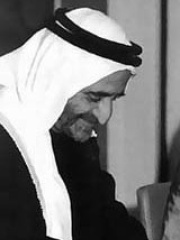
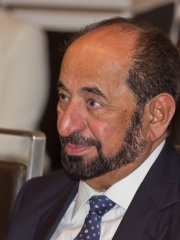
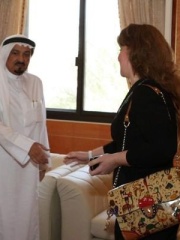

The Most Famous
POLITICIANS from United Arab Emirates
This page contains a list of the greatest Emirati Politicians. The pantheon dataset contains 19,576 Politicians, 15 of which were born in United Arab Emirates. This makes United Arab Emirates the birth place of the 130th most number of Politicians behind Nauru, and Singapore.
Top 10
The following people are considered by Pantheon to be the top 10 most legendary Emirati Politicians of all time. This list of famous Emirati Politicians is sorted by HPI (Historical Popularity Index), a metric that aggregates information on a biography's online popularity. Visit the rankings page to view the entire list of Emirati Politicians.

1. Mohammed bin Rashid Al Maktoum (b. 1949)
With an HPI of 80.63, Mohammed bin Rashid Al Maktoum is the most famous Emirati Politician. His biography has been translated into 63 different languages on wikipedia.
Sheikh Mohammed bin Rashid Al Maktoum (Arabic: محمد بن راشد آل مكتوم, romanized: Muḥammad bin Rāšid Āl Maktūm; born 15 July 1949) is an Emirati politician and royal who is the current ruler of Dubai, and serves as the vice president and prime minister of the UAE. Mohammed succeeded his brother Maktoum bin Rashid Al Maktoum as UAE vice president, UAE prime minister, and ruler of Dubai following the latter's death in 2006. A billionaire, Mohammed generates most of his income from real estate and is described as "one of the world's most prominent real estate developers". The line is blurred between the assets of the Government of Dubai and those of the ruling Al Maktoum family. Any land he owns is managed as an asset of the state. He oversaw the growth of Dubai into a global city, as well as the launch of a number of government-owned enterprises including the Emirates airline, DP World, and the Jumeirah Group. Some of these are held by Dubai Holding. Mohammed has overseen the development of certain projects in Dubai, such as the Palm Islands and the Burj Al Arab hotel, as well as Burj Khalifa, the tallest building in the world since 2010. Mohammed is the absolute ruler of Dubai and the prime minister of the UAE, a position appointed by the president. The government is autocratic. On 5 March 2020, a British court ruled that on the balance of probabilities, Mohammed had abducted two of his daughters, Shamsa and Latifa, and had threatened his former wife, the Jordanian princess Haya bint Hussein. Allegedly, Shamsa and Latifa were forcibly medicated while held in Dubai under Mohammed's orders since 2000 and 2018, respectively. On 16 February 2021, the BBC's Panorama broadcast a documentary featuring Latifa's video messages that she made secretly under enforced detention in Dubai on her father's orders. Mohammed is an equestrian and is the founder of the Maktoum family-owned Godolphin stable and the owner of Darley, a thoroughbred breeding operation, operational in six countries. In 2012, he rode the horse Madji Du Pont 160 km to take the FEI World Endurance Championship.

2. Khalifa bin Zayed Al Nahyan (1948 - 2022)
With an HPI of 74.16, Khalifa bin Zayed Al Nahyan is the 2nd most famous Emirati Politician. His biography has been translated into 77 different languages.
Sheikh Khalifa bin Zayed bin Sultan Al Nahyan (Arabic: خليفة بن زايد بن سلطان آل نهيان; 7 September 1948 – 13 May 2022) was the second president of the United Arab Emirates and the ruler of Abu Dhabi. Khalifa was the eldest son of Zayed bin Sultan Al Nahyan, the first president of the United Arab Emirates. As crown prince of Abu Dhabi, Khalifa carried out some aspects of the presidency in a de facto capacity from the late 1990s when his father experienced health problems. He succeeded his father as the ruler of Abu Dhabi on 2 November 2004, and the Federal Supreme Council elected him as president of the UAE the following day. As ruler of Abu Dhabi, he attracted cultural and academic centres to Abu Dhabi, helping establish the Louvre Abu Dhabi, New York University Abu Dhabi and Sorbonne University Abu Dhabi. He also established Etihad Airways. During Khalifa's presidency, the United Arab Emirates became a regional economic powerhouse and its non-oil economy grew. Khalifa was viewed as a pro-Western modernizer whose low-key approach helped steer the country through a tense era in regional politics and forged closer ties with the United States and Israel. As president during the 2008 financial crisis, he directed the payment of billions of dollars in emergency bailout funds into Dubai. On 4 January 2010, the world's tallest man-made structure, originally known as Burj Dubai, was renamed the Burj Khalifa in his honor. In January 2014, Khalifa had a stroke and was in stable condition after surgery. He then assumed a lower profile in state affairs but retained ceremonial presidential powers. His half-brother Mohamed bin Zayed Al Nahyan carried out public affairs of the state and day-to-day decision-making of the Emirate of Abu Dhabi. In 2018, Forbes named Khalifa in its list of the world's most powerful people. Following his death on 13 May 2022, Khalifa was succeeded by his brother Mohamed.

3. Mohammed bin Zayed Al Nahyan (b. 1961)
With an HPI of 73.36, Mohammed bin Zayed Al Nahyan is the 3rd most famous Emirati Politician. His biography has been translated into 55 different languages.
Mohamed bin Zayed Al Nahyan (born 11 March 1961), also known as MBZ or MbZ, is an Emirati royal and politician who has served as the third president of the United Arab Emirates and the ruler of Abu Dhabi since 2022. Mohamed completed his education in Abu Dhabi and Al Ain and graduated from the Royal Military Academy Sandhurst in April 1979. He later joined the UAE Armed Forces and held various posts before becoming a pilot in the UAE Air Force; he was promoted to general in 2005. Mohamed is the third son of Sheikh Zayed bin Sultan Al Nahyan, the first president of the UAE and the 16th ruler of Abu Dhabi. Mohamed became the crown prince of Abu Dhabi in November 2004, following the death of his father, when his brother, Sheikh Khalifa became the second president of the UAE and the ruler of Abu Dhabi. In 2014, Sheikh Khalifa suffered a stroke and Mohamed became the de facto president of the UAE and ruler of Abu Dhabi. Mohamed officially became president of the UAE and ruler of Abu Dhabi, after being chosen by the UAE Supreme Council, following the death of his brother on 13 May 2022. On 29 March 2023, Mohamed appointed his son Sheikh Khalid as crown prince of Abu Dhabi and his future successor. Scholars characterize the UAE under Mohamed as an authoritarian capitalist country, and a rentier state. In 2019, The New York Times named Mohamed as the most powerful Arab ruler, and was named as one of the 100 Most Influential People of 2019 by Time magazine. He is known to be an opponent of the Muslim Brotherhood, Iran and its proxies in the Middle East. Since becoming de facto president, the UAE participated in the war against ISIS in Iraq and Syria, the Syrian civil war and was officially part of the Saudi-led coalition in Yemen until Mohamed disagreed with Saudi Arabia's approach in the war for its support of Al-Islah, a party which is known to have close connections with the Muslim Brotherhood but has maintained his support of the Southern Transitional Council. Mohamed has also been the main backer of the Rapid Support Forces (RSF) in the Sudanese civil war. He fell out with the Obama administration on the Iran nuclear deal and supported the US withdrawal from the Iran nuclear deal. The UAE was a leading party in the Qatar diplomatic crisis, in which the UAE, Saudi Arabia, Bahrain and other Arab countries like Egypt and Jordan severed diplomatic relations with Qatar based on claims that Qatar supports the Muslim Brotherhood and its offshoot organizations. Mohamed maintained a close relationship with US President Donald Trump, with reports suggesting that Mohamed was pushing Trump to take a tougher stance on Iran and the Muslim Brotherhood. In September 2020, the UAE, alongside Bahrain, and later Morocco and Sudan, signed the Abraham Accords, an agreement to normalize diplomatic relationship with the State of Israel, a deal which was brokered by Trump. The UAE has more recently been involved in an economic rivalry with Saudi Arabia, and opposed Saudi efforts for OPEC+ production cuts.

4. Zayed bin Sultan Al Nahyan (1918 - 2004)
With an HPI of 73.00, Zayed bin Sultan Al Nahyan is the 4th most famous Emirati Politician. His biography has been translated into 53 different languages.
Sheikh Zayed bin Sultan Al Nahyan (Arabic: زايد بن سلطان آل نهيان, romanized: Zāyid bin Sulṭān Āl Nahyān; 6 May 1918 – 2 November 2004) was an Emirati politician, philanthropist, and the founding father of the United Arab Emirates. Zayed served as the governor of Eastern Region from 1946 until he became the ruler of Abu Dhabi in 1966, and served as the first president of the United Arab Emirates from its independence on 2 December 1971 until his death in 2004. He is referred in the United Arab Emirates as the Father of the Nation for being the principal driving force behind the unification of the United Arab Emirates. Zayed replaced his older brother Sheikh Shakhbut bin Sultan as the ruler of Abu Dhabi on 6 August 1966 after Shakhbut was deposed through a bloodless coup by members of the ruling family with British support.
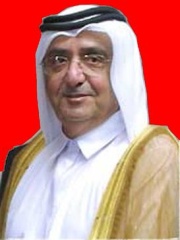
5. Maktoum bin Rashid Al Maktoum (1943 - 2006)
With an HPI of 67.31, Maktoum bin Rashid Al Maktoum is the 5th most famous Emirati Politician. His biography has been translated into 36 different languages.
Sheikh Maktoum bin Rashid Al Maktoum (Arabic: مكتوم بن راشد آل مكتوم, romanized: Maktūm bin Rāšid Āl Maktūm; 15 August 1943 – 4 January 2006) was an Emirati royal and politician who served as the second vice president, first and third prime minister of the United Arab Emirates, and ruler of Dubai. He was prime minister from 1971 to 1979 and from 1990 to 2006. He served as the ruler of Dubai from 1990 to 2006. He was succeeded after his death by his brother Sheikh Mohammed as Ruler of Dubai.

6. Rashid bin Saeed Al Maktoum (1912 - 1990)
With an HPI of 66.25, Rashid bin Saeed Al Maktoum is the 6th most famous Emirati Politician. His biography has been translated into 26 different languages.
Sheikh Rashid bin Saeed Al Maktoum (Arabic: رَاشِد بن سَعِيْد آل مَكتُوم, romanized: Rāšid bin Saʿīd Āl Maktūm; 11 June 1912 – 7 October 1990) was an Emirati royal, politician and one of the Founding Fathers of the United Arab Emirates. Rashid bin Saeed was the first vice president and second prime minister of the United Arab Emirates, and was the ruler of Dubai from 1958–1990. His son, Maktoum, was the UAE's first prime minister. He was vice president of the UAE from the nation's independence and foundation in 1972 until his death. Sheikh Rashid was the first Emirati vice president to serve concurrently as prime minister, when he became prime minister on 30 April 1979. After his death the office of prime minister was de facto tied to the office of vice president. He was responsible for the transformation of Dubai from a small settlement around Dubai Creek to a modern port city, regional commercial hub and entrepôt.

7. Sultan bin Muhammad Al-Qasimi (b. 1939)
With an HPI of 61.01, Sultan bin Muhammad Al-Qasimi is the 7th most famous Emirati Politician. His biography has been translated into 21 different languages.
Sheikh Sultan bin Muhammad Al-Qasimi (Arabic: سلطان بن محمد القاسمي, romanized: Sulṭān bin Muḥammad al-Qāsimī; born 2 July 1939) is an Emirati politician, author, historian, and the current and 11th ruler of the Emirate of Sharjah and a member of the Federal Supreme Council of the United Arab Emirates since January 1972. He is best known for his historical publications, support for education, and preservation of cultural landmarks. He restored the Al Hisn Fort in Sharjah in 1970 and served as the United Arab Emirates first Minister of Education in 1971. As an academic, he has authored multiple historical documents as well as memoirs, studies, novels, poetry and plays regarding the Middle East and North Africa.

8. Humaid bin Rashid Al Nuaimi III (b. 1931)
With an HPI of 58.09, Humaid bin Rashid Al Nuaimi III is the 8th most famous Emirati Politician. His biography has been translated into 17 different languages.
Sheikh Humaid bin Rashid Al Nuaimi III (Arabic: حميد بن راشد النعيمي, romanized: Ḥumayd bin Rāshid al-Nuʿaymī; born 1931) is an Emirati royal, politician, who serves as the ruler of the Emirate of Ajman and a member of the Federal Supreme Council. He is the 10th ruler of Ajman. Humaid bin Rashid succeeded his late father Sheikh Rashid bin Humaid Al Nuaimi III on 6 September 1981. He previously served as deputy ruler since 1960.

9. Ali Bujsaim (b. 1959)
With an HPI of 55.87, Ali Bujsaim is the 9th most famous Emirati Politician. His biography has been translated into 22 different languages.
Ali Mohamed Bujsaim (Arabic: علي بوجسيم, born September 9, 1959, in Dubai) is a retired association football referee from the United Arab Emirates, who is best known for supervising matches at three FIFA World Cups: 1994 (two matches), 1998 (three matches) and 2002 (two matches). In 2002, he was a referee in the Argentina-Sweden match, where he made a decision to give a red card to Claudio Caniggia, when the latter cursed at him, making Caniggia the first player in world cup history to be expelled while still at the bench.
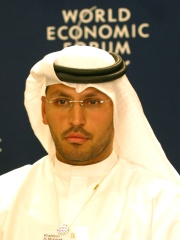
10. Khaldoon Al Mubarak (b. 1975)
With an HPI of 54.58, Khaldoon Al Mubarak is the 10th most famous Emirati Politician. His biography has been translated into 21 different languages.
Khaldoon Khalifa Al Mubarak (Arabic: خلدون المبارك; born 27 January 1976) is an Emirati government official and business leader. Al Mubarak holds senior positions within the Government of Abu Dhabi, including as a member of the Executive Council since 2006, a member of the Supreme Council for Financial and Economic Affairs, and as the founding chairman of the Executive Affairs Authority. He fulfills responsibilities for the UAE Federal government and has served as Presidential Special Envoy to the People's Republic of China since 2018. Al Mubarak is chief executive officer and managing director of Mubadala Investment Company. He is chairman of the football clubs Manchester City, Melbourne City and Mumbai City. Al Mubarak is on the board of the UAE business ADNOC and serves as the Chairman of the Boards of the Emirates Nuclear Energy Corporation, Abu Dhabi Commercial Bank and Emirates Global Aluminium.
People
Pantheon has 15 people classified as Emirati politicians born between 1912 and 1987. Of these 15, 11 (73.33%) of them are still alive today. The most famous living Emirati politicians include Mohammed bin Rashid Al Maktoum, Mohammed bin Zayed Al Nahyan, and Sultan bin Muhammad Al-Qasimi. The most famous deceased Emirati politicians include Khalifa bin Zayed Al Nahyan, Zayed bin Sultan Al Nahyan, and Maktoum bin Rashid Al Maktoum. As of April 2024, 2 new Emirati politicians have been added to Pantheon including Abdullah bin Zayed Al Nahyan, and Khaled bin Mohamed Al Nahyan.
Living Emirati Politicians
Go to all RankingsMohammed bin Rashid Al Maktoum
1949 - Present
HPI: 80.63
Mohammed bin Zayed Al Nahyan
1961 - Present
HPI: 73.36
Sultan bin Muhammad Al-Qasimi
1939 - Present
HPI: 61.01
Humaid bin Rashid Al Nuaimi III
1931 - Present
HPI: 58.09
Ali Bujsaim
1959 - Present
HPI: 55.87
Khaldoon Al Mubarak
1975 - Present
HPI: 54.58
Hamdan bin Mohammed Al Maktoum
1982 - Present
HPI: 54.19
Abdullah bin Zayed Al Nahyan
1972 - Present
HPI: 49.41
Khaled bin Mohamed Al Nahyan
1982 - Present
HPI: 45.13
Lubna Khalid Al Qasimi
1962 - Present
HPI: 45.00
Sarah Al Amiri
1987 - Present
HPI: 42.60
Deceased Emirati Politicians
Go to all RankingsKhalifa bin Zayed Al Nahyan
1948 - 2022
HPI: 74.16
Zayed bin Sultan Al Nahyan
1918 - 2004
HPI: 73.00
Maktoum bin Rashid Al Maktoum
1943 - 2006
HPI: 67.31
Rashid bin Saeed Al Maktoum
1912 - 1990
HPI: 66.25
Newly Added Emirati Politicians (2025)
Go to all RankingsAbdullah bin Zayed Al Nahyan
1972 - Present
HPI: 49.41
Khaled bin Mohamed Al Nahyan
1982 - Present
HPI: 45.13
Overlapping Lives
Which Politicians were alive at the same time? This visualization shows the lifespans of the 4 most globally memorable Politicians since 1700.

